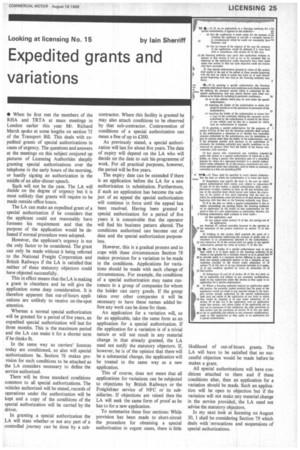Expedited grants and variations
Page 27

If you've noticed an error in this article please click here to report it so we can fix it.
by lain Sherriff
• When he first met the members of the RHA and TRTA at mass meetings in London earlier this year Mr. Richard Marsh spoke at some lengths on section 75 of the Transport Bill. This deals with expedited grants of special authorizations in cases of urgency. The questions and answers at the meetings on this subject conjured up pictures of Licensing Authorities sleepily granting special authorizations over the telephone in the early hours of the morning, or hastily signing an authorization in the middle of an after-dinner speech.
Such will not be the case. The LA will decide on the degree of urgency but it is most unlikely that grants will require to be made outside office hours.
The LA can make an expedited grant of .a special authorization if he considers that the applicant could not reasonably have foreseen his requirement and that the purpose of the application would be defeated if normal procedure were adopted.
However, the applicant's urgency is not the only factor to be considered. The grant can only be made without it being referred to the National Freight Corporation and British Railways if the LA is satisfied that neither of these statutory objectors could have objected successfully.
This in effect means that the LA is making a grant in chambers and he will give the application some deep consideration. It is therefore apparent that out-of-hours applications are unlikely to receive on-the-spot attention.
Whereas a normal special authorization will be granted for a period of five years, an expedited special authorization will last for three months. This is the maximum period and the LA can make it for a shorter term if he thinks fit.
In the same way as carriers' licences today are conditioned, so also will special authorizations be. Section 76 makes provision for such conditions to be attached as the LA considers necessary to define the service authorized.
There will be three standard conditions common to all special authorizations. The vehicles authorized will be stated, records of operations under the authorization will be kept and a copy of the conditions of the special authorization will be carried by the driver.
In granting a special authorization the LA will state whether or not any part of a controlled journey can be done by a sub contractor. Where this facility is granted he may also attach conditions to be observed by that sub-contractor. Contravention of conditions of a special authorization can mean a fine of up to L200.
As previously stated, a special authorization will last for about five years. The date of expiry will depend on the LA who will decide on the date to suit his programme of work. For all practical purposes, however, the period will be five years.
The expiry date can be extended if there is an application before the LA for a new authorization in substitution. Furthermore, if such an application has become the subject of an appeal the special authorization will continue in force until the appeal has been resolved. Having been granted a special authorization for a period of five years it is conceivable that the operator will find his business pattern altered. The conditions authorized can become out of date and the special authorization purposeless.
However, this is a gradual process and to cope with these circumstances Section 78 makes provision for a variation to be made in the conditions. Applications for variations should be made with each change of circumstances. For example, the conditions of a special authorization may name customers in a group of companies for whom the holder can carry goods. If the group takes over other companies it will be necessary to have these names added before any work can be done for them.
An application for a variation will, so far as applicable, take the same form as an application for a special authorization. If the application for a variation is of a trivial nature or will not result in any material change in that already granted, the LA need not notify the statutory objectors. If, however, he is of the opinion that there will be a substantial change, the application will be treated in the same way as a new application.
This of course, does not mean that all applications for variations can be subjected to objections by British Railways or the Freightliner service of NFC or its subsidiaries. If objections are raised then the LA will seek the same form of proof as he has to for a new application.
To summarize these four sections: While provision has been made to short-circuit the procedure for obtaining a special authorization in urgent cases, there is little likelihood of out-of-hours grants. The LA will have to be satisfied that no successful objection would be made before he makes a grant.
All special authorizations will have conditions attached to them and if these conditions alter, then an application for a variation should be made. Such an application will be open to objection but if the variation will not make any material change in the service provided, the LA need not advise the statutory objectors.
In my next look at licensing on August 30, I shall be considering Section 79 which deals with 'revocations and suspensions of special authorizations.




































































































